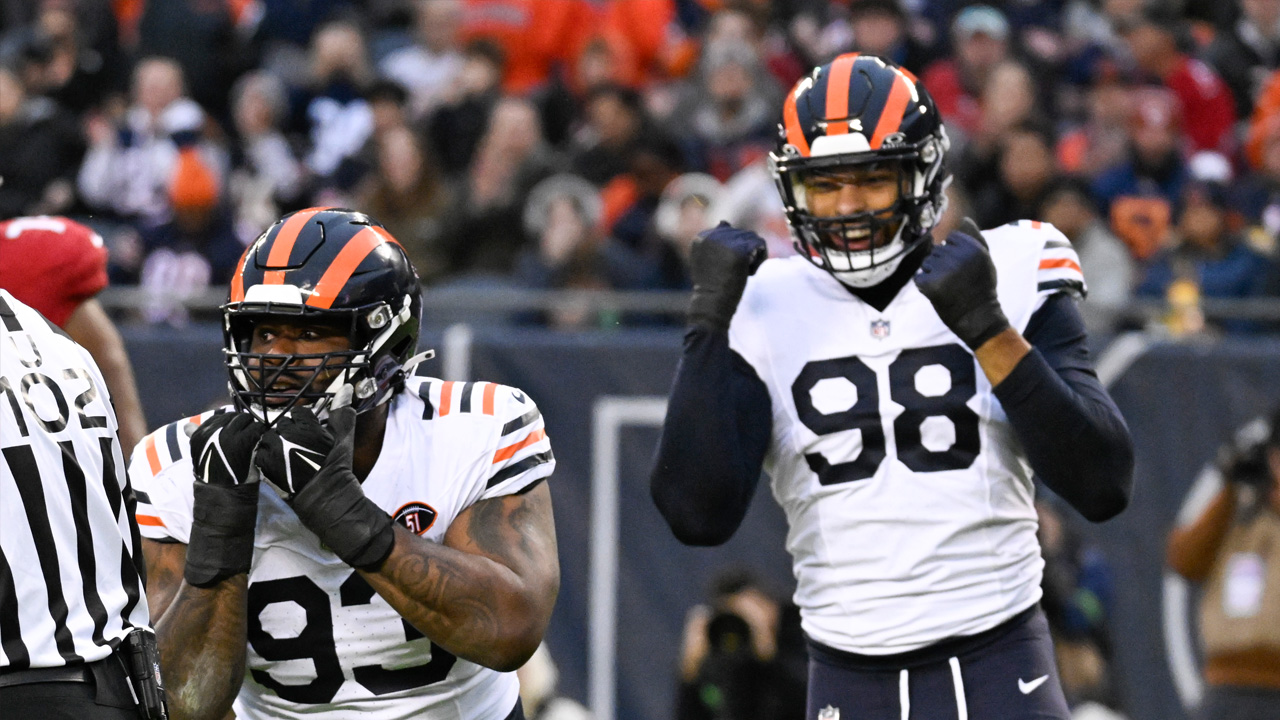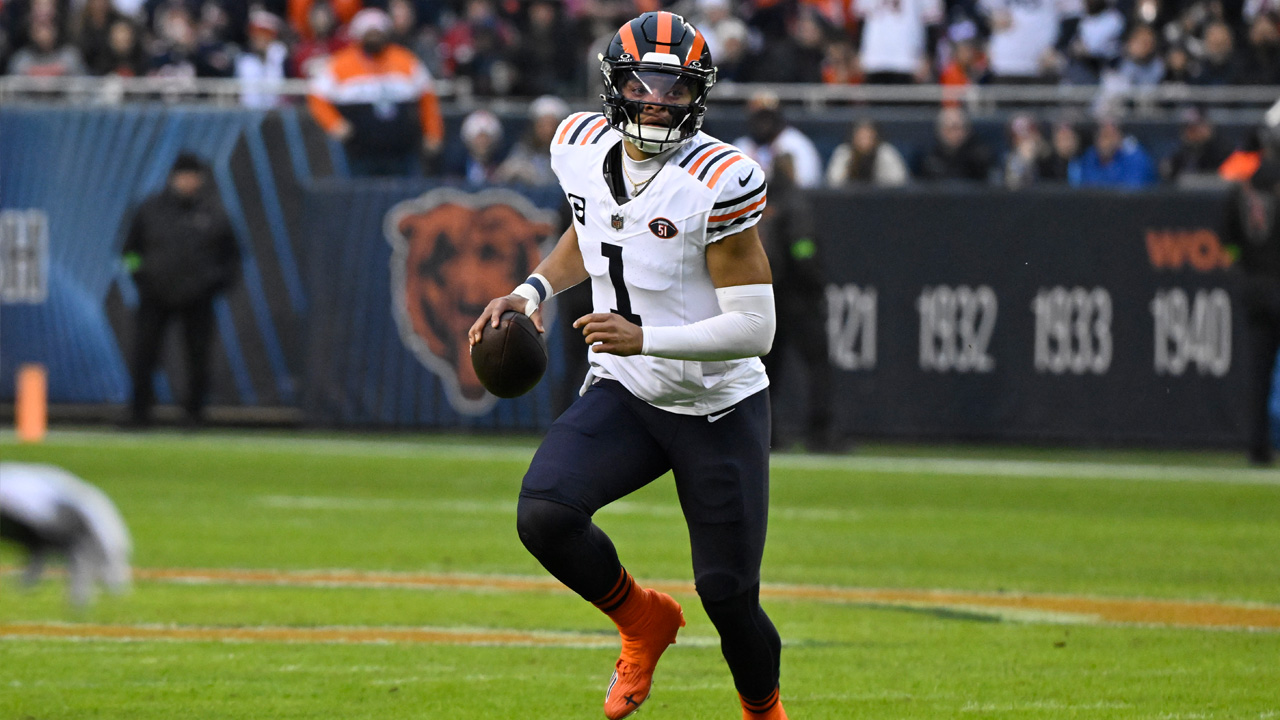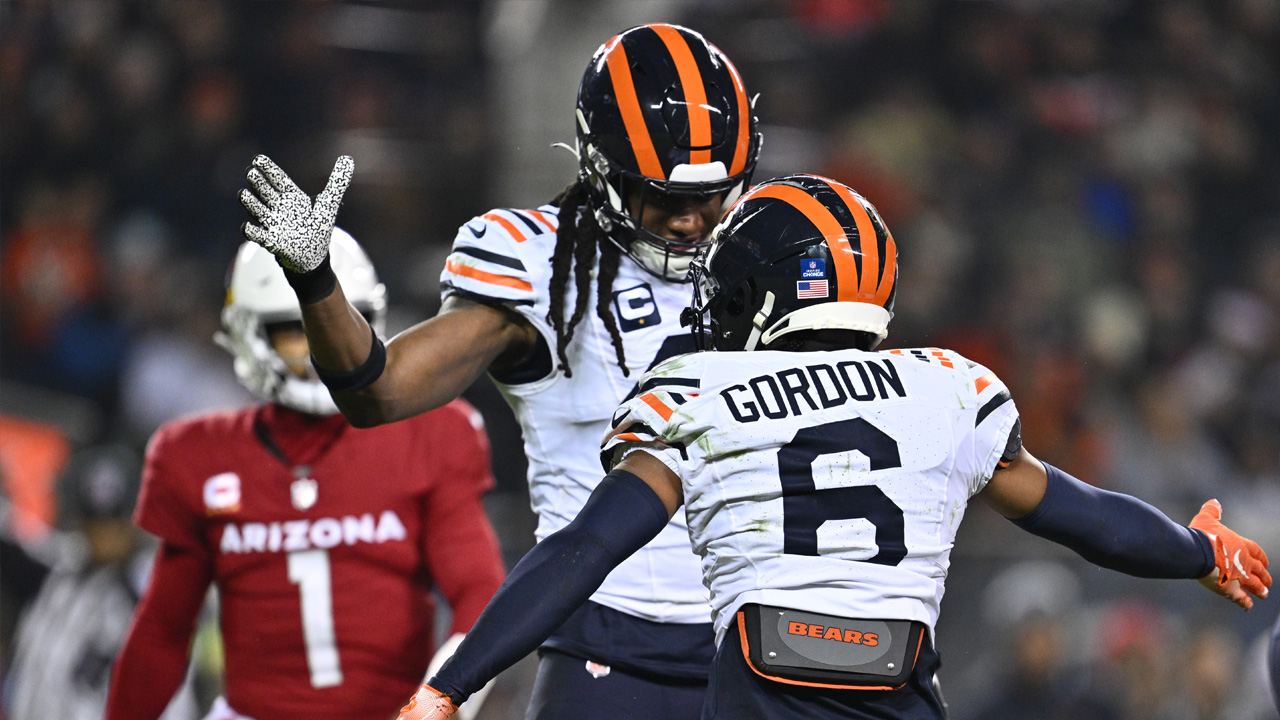LAKE FOREST, Ill. -- All season, Bears head coach Matt Eberflus has harped on the need for his offense to stretch the field vertically in the passing game. Quarterback Justin Fields has echoed a similar sentiment and has the arm talent to beat teams deep. The Bears have the weapons needed to carry out such a plan.
And yet, through 15 games, the Bears' offense has been unable to consistently attack teams vertically. The Bears rank 24th in passes of 20-plus yards this season. The teams below them are a who's who of franchises with quarterback issues (Giants, Broncos, Steelers, Cardinals, Patriots, Jets, Raiders, Panthers).
Per Pro Football Focus, Fields ranks ninth in completion percentage and seventh in passer rating on throws of 20 or more yards downfield. But he only ranks 18th in both attempts and yards on those deep throws, which speaks to the Bears' inability to get the downfield passing game working consistently in 2023.
Stay in the game with the latest updates on your beloved Chicago sports teams! Sign up here for our All Access Daily newsletter.
“I would just say we’ve gotta keep getting after it, just keep doing it and keep taking out shots and keep making those connections," Eberflus said Tuesday at Halas Hall. "Hopefully these next two games we will, we will make those connections with DJ, with the guys that go down the field, Mooney and different guys, and Cole’s done a good job with that, too. We’ve just gotta keep doing it.”
The Bears hit three explosive pass plays in Sunday's win over the Arizona Cardinals, all of which went to tight end Cole Kmet. The downfield passing attack was stunted against the Cardinals partly due to Kmet exiting at halftime with a knee injury and Moore being used mainly as a decoy due to an ankle injury.
The Bears' issues in the passing game aren't isolated to the downfield attack. Their inability to consistently utilize Fields' proficient deep-ball throwing might be a symptom of a larger issue.
After 15 games, the Bears rank 28th in passing yards per game, 29th in total passing yards, 26th in passer rating, 25th in yards per attempt, and 22nd in completion percentage. Fields ranks 22nd in EPA per play, 27th in success rate, and 16th in Completion Percentage Over Expectation.
The passing game, as a whole, just hasn't clicked consistently this season. There have been good moments. The Week 5 win over the Washington Commanders, the Week 4 output against the Denver Broncos, and the Week 14 win over the Detroit Lions come to mind.
But overall, it hasn't been good enough.
“If it’s at [28], it’s not where it needs to be, right?" Eberflus said Tuesday. "We just got to just continue to work on that. It’s got to, to your point, get the downfield, explosive throws. How you score in the NFL is to get explosive passes and explosive runs. That’s what you need to do. I felt we did a really good job getting those explosive runs on Sunday. Herbert did a heck of a job running the ball. I thought the line did a really good job of that, but to your point, we got to get some of those explosive passes. We had a few but we need to get more.”
CHICAGO BEARS
The Bears' offense has also notably struggled in short-yardage plays this season.
The Bears have converted only 72 percent of their runs on third-and-1 or third-and-2 into first downs. They've converted only 66.6 percent of their pass attempts on such plays. Those numbers dip to 55.5 and 50 percent, respectively, on fourth down.
For comparison, the Buffalo Bills have converted 80 percent of their third-and-short runs and 100 percent of their fourth-and-short runs. The San Francisco 49ers convert 82.6 and 66.6 percent, while the Philadelphia Eagles convert 80.77 and 83.33 percent.
The most proficient teams in short-yardage situations find the right balance between having a staple play (The Brotherly Shove) and getting creative. The Bears have been unable to find consistent success with either.
In their Week 15 loss to the Cleveland Browns, the Bears called a fly sweep to Tyler Scott on third and short that was stuffed. On fourth-and-1, Getsy dialed up a play that had Moore pop open for what would have been a touchdown, but Fields chose to tuck it and bolt for the line to gain and was tripped up short of the marker.
In the win over the Cardinals, a wild-cat run by Roschon Johnson on third-and-1 gained nothing, and the Bears were forced to punt. Getsy has tried the tight end sneak, the quarterback sneak, straight power runs, bootlegs, etc. None have been consistently successful.
"We have to do a better job with short yardage," Eberflus said Tuesday. "There’s no question about that. You have to have a staple, something that you go to. It’s usually the sneak or the wedge or the rugby, whatever you’re calling that, the Philadelphia play. We’ve done that a couple times, but we need to be more effective at that. We’re looking to be more effective at that, because you need something like that where you can always go to that, and then you need some stuff that hits the perimeter, because teams will load up inside there on you, pack everybody inside and leave themselves vulnerable on the outside. I do think you need that. We certainly have that in our arsenal, too. But it just comes down to execution. It comes down to the guys executing the push play better and also the perimeter plays better.”
When asked if he'd prefer Getsy to put the ball in Fields' hands in those situations instead of the assorted wrinkles, Eberflus said that was preferable. But the head coach also noted the Bears need to have "multiplicity" in those situations so they don't become predictable.
The Bears are 6-9 and markedly improved in several areas in 2023. They rank second in rushing offense, and their defense is a piece away from being an elite unit in 2024.
But the downfield passing and short-yardage issues are problems the Bears have been unable to solve this season, and they could be the leading reasons why needed change is likely to come this offseason -- whether that be at quarterback, offensive coordinator, or both.
The Fields-Getsy partnership has grown in Year 2. But the improvement hasn't hit the exponential jump many believed was on the horizon entering the season. There are many reasons for the inconsistency in the passing game and the failures in short-yardage.
But when the Bears sit down after the season and look at the root cause of their issues, it will be hard for them to look past Fields and Getsy's inability to put their heads together and create a fix.
Continuity and consistency are often the safest way to success in the NFL. There's an argument to be made for the Bears keeping most of the band together for 2024. After the win vs. the Cardinals, Fields pointed to another year in the system as a primary reason for the Bears' record improvement, along with increased talent.
Keeping the Fields-Getsy duo together might not give the Bears the potentially high ceiling of [insert rookie QB and new OC here], but it could give them a solid floor that can be raised with more additions to the skill group.
But with a passing attack ranked in the bottom third of the league in almost every category and an inability to consistently move the sticks in key, short-yardage situations, it's clear that something, if not everything, has to change this offseason for the Bears.



